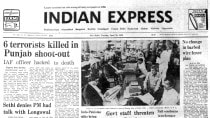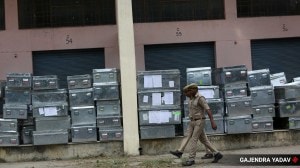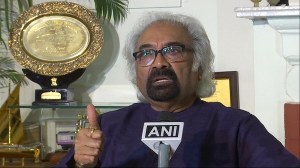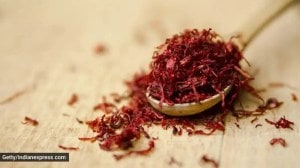- India
- International
The memory of loss
The filming of ‘Garam Hawa’ was cathartic for its makers, each of whom had been irreversibly touched by Partition.
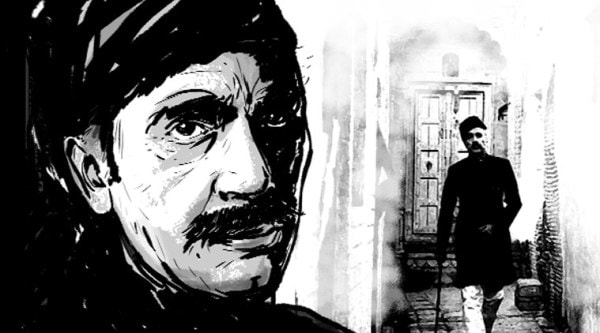 Bhisham Sahni’s ‘Tamas’ was a first-hand account of Partition. But Garam Hawa was Balrajji’s Partition, his channelling of the experiences that those closest to him had had. (Source: Express photo by Pradeep Yadav)
Bhisham Sahni’s ‘Tamas’ was a first-hand account of Partition. But Garam Hawa was Balrajji’s Partition, his channelling of the experiences that those closest to him had had. (Source: Express photo by Pradeep Yadav)
Harshi Anand
When it was announced that Garam Hawa would be re-released, everyone around me gushed about the film’s brilliance. My children urged their children to sieze the opportunity to watch it. For me, now an 83-year-old grandmother, Garam Hawa brings back memories of my mama, Balraj Sahni, and inevitably, I feel like the young girl who grew up in the warmth of his embrace and his letters. Balrajji had lost five sisters as a young boy, including my own mother. Both Balrajji and his brother, Bhisham Sahni, were uncles, brothers and often fathers to me and my siblings. Dammo behnji, Balrajji’s wife, was like the mother I had never known.
When Garam Hawa was being made, Balrajji himself was going through a bereavement. The memory of the acute sadness of the man whom I had thought invincible will always be my enduring association with this film. I see in Garam Hawa, Balrajji’s last film, not only one of the most astute films of its era, but also the story of my uncle’s life. He died before it was released and never saw the film in its final avatar. But there could not be a more fitting end to his illustrious career and to a life well lived.
Balrajji experienced Partition in a way that was very different from Mirza, his character in Garam Hawa. While his work had brought him to Bombay from Rawalpindi well before 1947, his parents, brother and other family personally experienced the wrench and the devastating dislocation of Partition when they moved to join him in 1947. Bhisham Sahni’s Tamas was a first-hand account of Partition. But Garam Hawa was Balrajji’s Partition, his channelling of the experiences those closest to him had had.
While Mirza helped him live through experiences he had not had himself, the character shared with him a visceral sadness. Around the time that the film was being made, Balrajji had lost a child in tragic circumstances. Mirza’s loss of his daughter in the film reflected a very real and fresh tragedy in my uncle’s life. A tragedy that he never recovered from. While many see in the film an actor delivering a masterful performance, for me and others who knew him, the thought of him having to relive his loss is painful.

In the confusion of the independence struggle, and later of Partition, regular life was frequently disrupted. Thanks to my very liberal father, I spent much of my formative years as a girl and then as a young woman wrapped up in the humdrum of Balrajji’s Bombay life and the magic of the Indian People’s Theatre Association (IPTA). Around 1948, aged 17, when the turmoil started in Srinagar, where I grew up, I left the Valley to stay for an extended period in Bombay. There was no school to attend and my days were spent travelling in the local trains to Deodhar Hall with Balrajji, Shailendra, Prem Dhavan and other stalwarts of the IPTA movement. I joined the IPTA singing squad and gained my happiest memories working with intellectual giants like Ali Sardar Jafri, Kaifi Azmi and Ahmad Abbas. I ran along beside my uncle as he went to speak across the city, in Dongri, in the most destitute slums, in the most communally sensitive localities. I was always amazed at the respect and love for Balrajji, even in otherwise tense and violent areas.
I fancied myself a revolutionary communist, entrusted with carrying “secret messages” between my heroes at the IPTA. More often than not, I took my job more seriously than necessary and swallowed dozens of chits en route when I suspected that the “enemy” was near. I even enjoyed the romantic advances of a young man who believed that reciting passages from The Communist Manifesto was the way to win my heart.
By the time the early 1970s came, when Garam Hawa was being made, my life had brought me to Delhi with my husband and children, far away from that world. But mamaji’s stories about the shooting and how so many IPTA members had come together on the project brought back all those memories. M.S. Sathyu, A.K. Hangal, Shama Zaidi, Kaifi Azmi and Shaukat Azmi and so many others reunited to collaborate on this seminal film. I always believed this film is what it is because it reflects the shared experiences of all those who made it. The chance to live or relive the experience of Partition became a cathartic moment for so many of those involved. All these members of the IPTA had been irreversibly touched by Partition in some way. Twenty-odd years later, the act of making this film probably became a therapeutic experience for its makers.
What makes the film brilliant — the fact that it is so close to the bone — is also the reason why I don’t think I will go and watch it now. Even as I am pulled towards it, and while I will send my grandchildren to watch it under duress, there are too many associations and memories attached to it. I don’t think my 83-year-old heart has the strength for it any more.
The writer was a member of IPTA
EXPRESS OPINION
More Explained
Apr 24: Latest News
- 01
- 02
- 03
- 04
- 05











